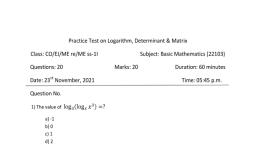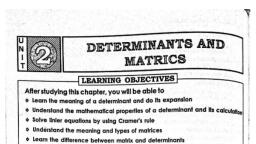Question 1 :
The determinant $\begin{vmatrix}a & b & a\alpha +b\\ b & c & b\alpha +c\\ a\alpha +b & b\alpha +c & 0\end{vmatrix}$ is equal to zero, if.
Question 2 :
$D=\begin{vmatrix} 18 & 40 & 89 \\ 40 & 89 & 198 \\ 89 & 198 & 440 \end{vmatrix}=$
Question 3 :
The product of a matrix and its transpose is an identity matrix. The value of determinant of this matrix is
Question 4 :
If $\Delta_1=\begin{vmatrix} 1 & 0\\ a & b\end{vmatrix}$ and $\Delta_2=\begin{vmatrix} 1 & 0\\ c & d\end{vmatrix}$ then $\Delta_2 \Delta_1$ is equal to<br>
Question 5 :
Find the value of the following determinant:<br/>$\begin{vmatrix}\displaystyle \frac{-4}{7} & \displaystyle \frac{-6}{35}\\ 5 & \displaystyle \frac{-2}{5}\end{vmatrix}$
Question 6 :
If $\begin{vmatrix} x & y\\ 4 & 2 \end{vmatrix}=7$ and $\begin{vmatrix} 2 & 3\\ y & x \end{vmatrix}=4$ then<br>
Question 7 :
Let a, b, c be three complex numbers, and let<br>$z=\begin{vmatrix}<br>0 & -b & -c\\ <br>b & 0 & -a\\ <br>c & a & 0<br>\end{vmatrix}$<br>then z equal<br>
Question 8 :
If $\begin{vmatrix} 6i & -3i & 1\\ 4 & 3i & -1 \\ 20 & 3 & i\end{vmatrix}=x+iy$, then<br>
Question 9 :
$\displaystyle \Delta = \begin{vmatrix}1 & \log_{x}y  & \log_{x}z \\ \log_{y}x & 1 & \log_{y}z \\ \log _{z}x  &\log _{z}y  & 1\end{vmatrix}$ is equal to <br/> <br/>
Question 10 :
If $\omega$ is a non-real cube root of unity and n is not a multiple of 3, then $\displaystyle \Delta =\left | \begin{matrix}<br>1 & \omega^{n} &\omega^{2n} \\ <br>\omega^{2n}&1 &\omega^{n} \\ <br>\omega^{n}&\omega^{2n} &1 <br>\end{matrix} \right |$ is equal to<br>
Question 11 :
Let $\omega\neq{1}$ be a cube root of unity and $S$ be the set of all non-singular matrices of the form $ \begin{bmatrix} 1 & a & b \\ \omega & 1 & c \\ { \omega }^{ 2 } & \omega & 1 \end{bmatrix}$Where each of $a,\ b$ and $c$ is either $\omega$ or ${\omega}^{2}$. Then the number of distinct matrices in the set $S$ is
Question 12 :
If $A$ is a $3\times 3$ matrix and $\text{det}  (3A)=k(\text{det}  A)$, then $k=$
Question 13 :
$A=\begin{bmatrix} 5 & 5a & a \\ 0 & a & 5a \\ 0 & 0 & 5 \end{bmatrix}$ If $\left| A^{ 2 } \right| =25$ then $|a|=$
Question 14 :
Find the values of x, if <br>$\begin{vmatrix} 2 & 4 \\ 5 & 1 \end{vmatrix}$= $\begin{vmatrix} 2x & 4 \\ 6 & x \end{vmatrix}$
Question 15 :
If $\displaystyle{\left| {_2^{4\,}\,\,_1^1} \right|^2} = \left| {_1^3\,\,_x^2} \right| - \left| {_{ - 2}^x\,\,_1^3} \right|,$ then $x$=
Question 16 :
Find the value of the following determinant:<br/>$\begin{vmatrix}3\sqrt{6} & -4\sqrt{2}\\ 5\sqrt{3} & 2\end{vmatrix}$
Question 17 :
If $\begin{vmatrix}a & -b & -c\\-a & b & -c \\ -a & -b & -c\end{vmatrix}+\lambda abc=0$, then $\lambda$ is equal to<br>
Question 18 :
Find x if it is given that:$\det \left[\begin{array}{lll}<br/>2 & 0 & 0\\<br/>4 & 3 & 0\\<br/>4 & 6 & x<br/>\end{array}\right]=42$<br/>
Question 19 :
If abc $\neq $0 and if $\begin{vmatrix}<br/>a & b & c\\ <br/>b & c & a\\ <br/>c & a & b<br/>\end{vmatrix}$ = 0 then $\dfrac{a^{3}+b^{3}+c^{3}}{abc}$ 
Question 20 :
$\begin{vmatrix} 2^3 & 3^3 & 3.2^2+3.2+1\\ 3^3 & 4^3 & 3.3^2+3.3+1\\ 4^3 & 5^3 & 3.4^2+3.4+1\end{vmatrix}$ is equal to?
Question 21 :
The value of the determinant$\begin{vmatrix} 5 & 1 \\ 3 & 2 \end{vmatrix}$
Question 22 :
$x = \left| \begin{gathered}   - 1\,\,\,\,\,\, - 2\,\,\,\,\,\,\, - 2 \hfill \\  \,\,\,2\,\,\,\,\,\,\,\,\,\,1\,\,\,\,\,\,\, - 2 \hfill \\  \,\,\,2\,\,\,\,\,\, - 2\,\,\,\,\,\,\,\,\,\,1 \hfill \\ \end{gathered}  \right|$, then $x=$
Question 23 :
If $A$ is any skew-symmetric matrix of odd order then $\left| A \right| $ equals
Question 24 :
$\mathrm{If}$ $\left|\begin{array}{lll}<br>1 & 0 & 0\\<br>2 & 3 & 4\\<br>5 & -6 & x<br>\end{array}\right|$ $= 45$ $\mathrm{t}\mathrm{h}\mathrm{e}\mathrm{n}$ $\mathrm{x}=$<br><br>
Question 25 :
If A $=\begin{bmatrix}<br>0 & c &-b \\ <br> -c& 0& a\\ <br>b & -a & 0<br>\end{bmatrix}$then$\left ( a^{2}+b^{2}-c^{2} \right )\left | A \right |=$
Question 26 :
If $A$ is a skew symmetric matrix, then $\left| A \right| $ is
Question 27 :
Find the value of the following determinant:<br/>$\begin{vmatrix}1.2 & 0.03\\ 0.57 & -0.23\end{vmatrix}$
Question 28 :
For positive numbers $x, y$ and $z$ the numerical value of the determinant $\begin{vmatrix} 1 & \log_x y & \log_x z\\ \log_y x & 1 & \log_y z \\ \log_z x & \log_z y & 1 \end{vmatrix}$ is<br>
Question 29 :
If $\begin{bmatrix} x & 1 & 1\\ 2 & 3 & 4\\ 1 & 1 & 1\end{bmatrix}$ has no inverse, then $x=$
Question 30 :
If $\begin{vmatrix} a & a & x\\ m & m & m\\ b & x & b\end{vmatrix}=0$ then $x=?$
Question 31 :
If $A = \begin{bmatrix}1& \log_{b}a\\ \log_{a}b& 1\end{bmatrix}$ then $|A|$ is equal to<br>
Question 32 :
Let the matrix A and B be defined as $A =\begin{vmatrix} 3 & 2 \\ 2 & 1 \end{vmatrix}$ and $B =\begin{vmatrix} 3 & 1 \\ 7 & 3 \end{vmatrix}$ then the value of Det.$(2A^9B^{-1})$, is
Question 33 :
<i></i>What is the determinant of the matrix $\left [\begin{matrix} 3& 6\\ -1 & 2\end {matrix} \right]$?<br/>
Question 34 :
Find the value of $x$ in $\begin{vmatrix} 2 & 4 \\ 5 & 1 \end{vmatrix}=\begin{vmatrix} 2x & 4 \\ 6 & x \end{vmatrix}$.
Question 35 :
If the value of the determinant $\begin{vmatrix}m & 2\\ -5 & 7\end{vmatrix}$ is $31$, find $m$.
Question 36 :
If the trivial solution is the only solution of the system of equations$x-ky+z=0,kx+3y-kz=0, 3x+y-z=0$. Then the set of all values of k is:<br>
Question 37 :
$|f(x)|={\begin{bmatrix}{}<br/>\mathrm{s}\mathrm{i}\mathrm{n}x & \mathrm{c}\mathrm{o}\mathrm{s}ecx & \mathrm{t}\mathrm{a}\mathrm{n}x\\<br/>\mathrm{s}\mathrm{e}\mathrm{c}x & x\mathrm{s}\mathrm{i}\mathrm{n}x & x\mathrm{t}\mathrm{a}\mathrm{n}x\\<br/>x^{2}-1 & \mathrm{c}\mathrm{o}\mathrm{s}x & x^{2}+1<br/>\end{bmatrix}}$ then . $.\displaystyle \int_{-a}^{a}|f(x)|d$ equals <br/><br/><br/>
Question 38 :
If $\begin{vmatrix}p& q - y& r - z\\ p - x& q & r - z\\ p - x& q - y& r\end{vmatrix} = 0$, then the value of $\dfrac {p}{x} + \dfrac {q}{y} + \dfrac {r}{z}$ is<br>
Question 39 :
If $f(x)=\begin{vmatrix} 1 & x & x+1\\ 2x & x(x-1) & (x+1)x\\ 3x(x-1) & x(x-1)(x-2) & (x+1)x(x-1)\end{vmatrix}$ then $f(100)$ is equal to?
Question 40 :
For a positive numbers $x, y$ and $z$ the numerical value of the determinant $\begin{bmatrix}1 & \log_{x} y & \log_{x} z \\ \log_{y} x & 1 & \log_{y} z\\ \log_{z} x & \log_{z} y & 1\end{bmatrix}$ is:
Question 41 :
If $f(x)=\left| \begin{matrix} \cos { x } \\ 2\sin { x } \\ \tan { x } \end{matrix}\begin{matrix} x \\ { x }^{ 2 } \\ x \end{matrix}\begin{matrix} 1 \\ 2x \\ 1 \end{matrix} \right|$, then$\lim _{ x\rightarrow 0 }{ \frac { f^{ \prime }\left( x \right) }{ x } }$
Question 42 :
If$p{\lambda ^4} + p{\lambda ^3} + p{\lambda ^2} + s\lambda + t = $ $\left| {\begin{array}{*{20}{c}}{{\lambda ^2} + 3\lambda } & {\lambda + 1} & {\lambda + 3}\\{\lambda + 1} & {2 - \lambda } & {\lambda - 4}\\{\lambda - 3} & {\lambda + 4} & {3\lambda }\end{array}} \right|$, then value of t is
Question 43 :
Let $\displaystyle \omega =-\frac{1}{2}+i\frac{\sqrt{3}}{2}$,then the value of the determinant<br>$\left | \begin{matrix}<br>1 & 1 &1 \\ <br>1& -1-\omega ^{2} &\omega ^{2} \\ <br>1& \omega ^{2} & \omega ^{4}<br>\end{matrix} \right |,$is<br>
Question 44 :
If$p{\lambda ^4} + p{\lambda ^3} + p{\lambda ^2} + s\lambda + t = $ $\left| {\begin{array}{*{20}{c}}{{\lambda ^2} + 3\lambda } & {\lambda + 1} & {\lambda + 3}\\{\lambda + 1} & {2 - \lambda } & {\lambda - 4}\\{\lambda - 3} & {\lambda + 4} & {3\lambda }\end{array}} \right|$, then value of t is
Question 45 :
$If\left| \begin{matrix} p & q-y & r-z \\ p-x & q & r-z \\ p-x & q-y & r \end{matrix} \right| =0$ and $x,y,z$ are non-zero then the value of $\dfrac{p}{x}+\dfrac{q}{y}+\dfrac{r}{z}$ is:
Question 46 :
lf $\alpha,\ \beta$ are the roots of the equation$x^{2}+x+1=0$ and $S_k={\alpha}^k+{\beta}^k ; k=1,2,3,4$ , then<br>$\left| \begin{matrix} 3 & 1+{ S }_{ 1 } & 1+{ S }_{ 2 } \\ 1+{ S }_{ 1 } & 1+{ S }_{ 2 } & 1+{ S }_{ 3 } \\ 1+{ S }_{ 2 } & 1+{ S }_{ 3 } & 1+{ S }_{ 4 } \end{matrix} \right| =\\$<br>
Question 47 :
If A, B and C are n $\times$ n matrix and det (A) $=$ 2, det (B) $=$ 3, and det (C) $=$ 5, then find the value of the $ 25\timesdet(A^2 BC^{-1})$ is equal to
Question 48 :
If $\triangle (r) = \begin{vmatrix}r& r^{3}\\ 1& n(n + 1)\end{vmatrix}$, then $\displaystyle \sum_{r = 1}^{n} \triangle (r)$ is equal to
Question 49 :
lf $\left|\begin{array}{lll}<br/>1 & 2 & x\\<br/>4 & -1 & 7\\<br/>2 & 4 & -6<br/>\end{array}\right|$ is a singular matrix, then $x$ is equal to <br/>
Question 50 :
If $A=\begin{bmatrix} x & 1 & -x \\ 0 & 1 & -1 \\ x & 0 & 7 \end{bmatrix}$ and $det(A)=\begin{vmatrix} 3 & 0 & 1 \\ 2 & -1 & 0 \\ 0 & 6 & 7 \end{vmatrix}$ then the value of $x$ is
Question 51 :
One of the roots of $\begin{vmatrix}x + a & b & c\\ a & x + b & c\\ a & b & x + c\end{vmatrix} = 0$ is
Question 52 :
If one of the roots of $\left |\begin{matrix} 3 & 5 & x\\ 7 & x & 7\\ x & 5 & 3\end{matrix}\right |=0$  is $- 10$, the other roots are
Question 53 :
.Let$\begin{vmatrix}<br> x&2 & x\\ <br> x^{2}&x & 6\\ <br>x & x& 6<br>\end{vmatrix}$=$ax^{4}+bx^{3}+cx^{2}+dx+e$ ,then the value of 5a + 4b + 3c + 2d + e is<br>equal to<br><br>
Question 54 :
If $f\left ( x \right )=\begin{vmatrix}<br>x & x^{2} & x^{3}\\ <br>1 & 2x & 3x^{2}\\ <br>0 & 2 & 6x<br>\end{vmatrix}$, then ${f}'\left ( 2 \right )$equal to<br>
Question 55 :
If $\displaystyle \Delta =\begin{vmatrix}<br>0 &b-a &c-a \\ <br>a-b &0 &c-b \\ <br>a-c &b-c &0 <br>\end{vmatrix}$ then $\displaystyle \Delta $ is equal to <br>
Question 56 :
The sum of the real roots of the equation<br>$\begin{vmatrix} x & -6 & -1 \\ 2 & -3x & x-3 \\ -3 & 2x & x+2 \end{vmatrix}=0$ is equal to
Question 57 :
$f(x)=\begin{vmatrix} \cos { x }  & x & 1 \\ 2\sin { x }  & { x }^{ 2 } & 2x \\ \tan { x }  & x & 1 \end{vmatrix}$. The value of $\displaystyle \lim _{ x\rightarrow 0 }{ \cfrac { f(x) }{ x }  } $ is equal to<br/>
Question 58 :
Let $A = \begin{pmatrix}x + 2& 3x\\ 3& x + 2\end{pmatrix}, B =\begin{pmatrix}x& 0\\ 5& x + 2\end{pmatrix}$. Then all solutions of the equation $det (AB) = 0$ is<br>
Question 59 :
Let $A$ be a non-singular matrix. Then $\left| adjA \right| $ is equal to
Question 60 :
The value of the determinant $\begin{vmatrix} \sin ^{ 2 }{ { 36 }^{ o } } & \cos ^{ 2 }{ { 36 }^{ o } } & \cot { { 135 }^{ o } } \\ \sin ^{ 2 }{ { 53 }^{ o } } & \cot { { 135 }^{ o } } & \cos ^{ 2 }{ { 53 }^{ o } } \\ \cot { { 135 }^{ o } } & \cos ^{ 2 }{ { 25 }^{ o } } & \cos ^{ 2 }{ { 65 }^{ o } } \end{vmatrix}$ is
Question 61 :
The value of the determinant $\begin{vmatrix}1& \cos (\alpha - \beta)& \cos \alpha\\ \cos(\alpha - \beta)& 1 & \cos \beta\\ \cos \alpha& \cos \beta& 1\end{vmatrix}$ is<br>
Question 62 :
<br>The value of the determinant $\begin{vmatrix}b^{2}-ab\,\, b-c\,\, bc-ac & & \\ ab-a^{2}\,\, a-b\,\, b^{2}-ab& & \\ bc-ac\,\, c-a\,\, ab-a^{2}& & \end{vmatrix}$ =
Question 63 :
Let $\triangle a=\begin{vmatrix} a-1 & n & 6 \\ { (a-1) }^{ 2 } & 2{ n }^{ 2 } & 4n-2 \\ { (a-1) }^{ 3 } & 3{ n }^{ 3 } & 3{ n }^{ 2 }-3n \end{vmatrix}$ . Then $\sum _{ a-1 }^{ n }{ \triangle a }$ is equal to
Question 64 :
If A =$ \begin{bmatrix} \alpha & 2 \\ 2 & \alpha\end{bmatrix}$ and | A$^3$ | = 125 then $\alpha$ is
Question 65 :
If $A = \dfrac{1}{\pi} \begin{bmatrix}sin^{-1}(\pi x) & tan^{-1}\left(\dfrac{x}{\pi} \right )\\ sin^{-1}\left( \dfrac{x}{\pi}\right)  & cot^{-1}(\pi x)\end{bmatrix}, B = \begin{bmatrix}-cos^{-1}(\pi x) & tan^{-1}\left(\dfrac{x}{\pi} \right )\\ sin^{-1}\left( \dfrac{x}{\pi}\right)  & tan^{-1}(\pi x)\end{bmatrix}$ then A - B is equal to
Question 66 :
$If\ g\left( x \right) \left| \begin{matrix} { a }^{ -x } & { e }^{ x\log _{ e }{ a } } & { x }^{ 2 } \\ { a }^{ -3x } & { { e }^{ 3x\log _{ e }{ a } } } & { x }^{ 4 } \\ { a }^{ -5x } & { { e }^{ 5x\log _{ e }{ a } } } & 1 \end{matrix} \right| then$
Question 67 :
If ${ \Delta }_{ r }=\begin{vmatrix} { a }^{ r } & { b }^{ r } & { c }^{ r } \\ a & b & c \\ 1-a & 1-b & 1-c \end{vmatrix}$. If $\displaystyle \sum _{ r=0 }^{ \infty }{ { \Delta }_{ r } } =0$, then which statement is true.
Question 68 :
If $\displaystyle 1,\omega ,\omega^{2} $ are cube roots of unity then $\displaystyle\begin{vmatrix}1 &\omega^{n} &\omega^{2n} \\\omega^{n} &\omega^{2n} &1 \\\omega ^{2n} &1 &\omega^{n} \end{vmatrix}$ equals<br>
Question 69 :
The value of $\begin{vmatrix}<br/>-a^{2} &ab &ac \\ <br/> ab& -b^{2} &bc \\ <br/>ac & bc& -c^{2}<br/>\end{vmatrix}$ is <br/>
Question 70 :
The determinant $\Delta = \begin{vmatrix} a^ 2(1+x) & ab & ac \\ ab & b^ 2(1+x) & bc \\ ac & bc & c^ 2(1+x) \end{vmatrix}$ is divisible by
Question 71 :
The roots of the equation $\begin{vmatrix}x-1&1 &1\\1&x-1 &1\\1&1&x-1\end{vmatrix} = 0$ are
Question 72 :
If $A = \begin{bmatrix} -4& -1\\ 3 & 1\end{bmatrix}$, then the determinant of the matrix $(A^{2016} - 2A^{2015} - A^{2014})$ is:<br/>
Question 73 :
$\left|\begin{array}{lll}<br>1 & \omega & \omega^{2}\\<br>\omega & \omega^{2} & 1\\<br>\omega^{2} & 1 & \omega<br>\end{array}\right|=\ldots$..<br>
Question 74 :
Let $\begin{Bmatrix}\Delta_{1},\Delta_{2},\Delta_{3},.....\Delta_{k}\end{Bmatrix}$ be the set of third orderdeterminants that can be made with thedistinct nonzero real numbers $a_{1},a_{2},a_{3},.......a_{9}.$Then<br>
Question 75 :
If $\Delta =\begin{vmatrix}<br>2 & -\sin \theta & 1\\ <br>-\sin \theta & 2 & \sin \theta \\ <br>-1 & -\sin \theta & 2<br>\end{vmatrix}$ then<br>
Question 76 :
If $x$ is a positive integer, then<br>$\begin{vmatrix} x! & (x+1)! & (x+2)! \\ (x+1)! & (x+2)! & (x+3)! \\ (x+2)! & (x+3)! & (x+4)! \end{vmatrix}$ is equal to
Question 77 :
State true or false. $\left| \begin{array} { c c c } { \sin \theta } & { \cos \theta } & { 1 } \\ { - \cos \theta } & { \sin \theta } & { 1 } \\ { 1 } & { 1 } & { 1 } \end{array} \right| = 1 + 2 \sin \theta$
Question 78 :
If $\theta = \dfrac{\pi }{12}$ and <br/>A=$\begin{bmatrix}<br/>\cos\theta  & \sin\theta \\ <br/> \sin\theta & \cos\theta <br/>\end{bmatrix}$ then det $(A^{6})$ =<br/>
Question 79 :
Let $\Delta =$ <br> $\begin{vmatrix} sin\theta cos \phi & sin\theta sin\phi & cos\theta \\ cos\theta cos\phi & cos\theta sin\phi & -sin\theta \\ -sin\theta sin\phi & sin\theta cos\phi & 0\end{vmatrix}$, then
Question 80 :
The sum of two non integral of roots of $\displaystyle \left | \begin{matrix}x &2 &5 \\ 3 &x &3 \\ 5 &4 &x \end{matrix} \right |=0$ is<br>
Question 81 :
If $\Delta=\begin{vmatrix} f(x) & f\left( \cfrac { 1 }{ x } \right) +f(x) \\ 1 & f\left( \cfrac { 1 }{ x } \right) \end{vmatrix}=0$ where;<br>$f(x)=a+b{x}^{n}$ and $f(2)=17$, then $f(5)$ is:
Question 82 :
If $A=\begin{vmatrix} 10 & 2 \\ 30 & 6 \end{vmatrix}\\ $ then $\left|A\right|=$
Question 83 :
The sum of infinite series$\begin{vmatrix}<br>1 &2 \\ <br>6 & 4<br>\end{vmatrix}+\begin{vmatrix}<br>\frac{1}{2} &2 \\ <br> 2& 4<br>\end{vmatrix}+\begin{vmatrix}<br>\frac{1}{4} & 2\\ <br> \frac{2}{3}& 4<br>\end{vmatrix}+$.......is
Question 84 :
$\begin{vmatrix} 10! & 11! & 12!\\ 11! & 12! & 13! \\ 12! & 13! & 14!\end{vmatrix}=$ __________.
Question 85 :
If $A + B + C = \pi$, then $\begin{vmatrix}\sin (A + B + C)& \sin B& \cos C\\ -\sin B& 0 & \tan A\\ \cos (A + B)& -\tan A& 0\end{vmatrix}$ is equal to<br>
Question 86 :
The solution set of the equation$\begin{vmatrix} 1 & 4 & 20 \\ 1 & -2 & 5 \\ 1 & 2x & 5{ x }^{ 2 } \end{vmatrix}=0$, is<br>
Question 87 :
The values of the determinant$\begin{vmatrix}1 &e^{\tfrac{i\pi}{3}}  &e^{\tfrac{i\pi}{4}} \\e^{-\tfrac{i\pi}{3}} & 1 &e^{\tfrac{2i\pi}{3}} \\e^{-\tfrac{i\pi}{4}} &e^{-\tfrac{2i\pi}{3}}  &1\end{vmatrix}$ is
Question 88 :
Consider the following statements:<br>$1$. Determinant is a square matrix.<br>$2$. Determinant is a number associated with a square matrix.<br>Which of the above statements is/are correct?<br>
Question 89 :
Assertion: If $\displaystyle \Delta \left ( x \right )=\begin{vmatrix}<br/><br/>\sin x-\cos x & \sin \left ( x-\frac{\pi }{3} \right ) & \cos \left ( x-\frac{\pi }{3} \right )\\ <br/><br/>\sin \left ( \frac{\pi }{3}-x \right ) & \tan \left ( x-\frac{\pi }{4} \right ) & \sec \left ( x-\frac{\pi }{4} \right )\\ <br/><br/>\cos \left ( \frac{2\pi }{3}+x \right ) & \sec \left ( \frac{3\pi }{4}+x \right ) & \cot \left ( x+\frac{\pi }{4} \right )<br/><br/>\end{vmatrix}$<br/><br/>then $\displaystyle \Delta \left ( \frac{\pi }{4} \right )=0$
Reason: If A is a skew symmetric matrix of odd order, then |A| =0.
Question 90 :
The least value of the product xyz for which the determinant $\begin{vmatrix} x & 1 & 1\\ 1 & y & 1\\ 1&1 & z\end{vmatrix}$ is non-negative, is :
Question 91 :
Assertion: $\displaystyle \Delta =\begin{vmatrix}<br><br>\sin \pi & \cos(x+\pi/4) & \tan(x-\pi/4)\\ <br><br>\sin(x-\pi/4) & -\cos(\pi/2) & \log(x/y)\\ <br><br>\cot(\pi/4+x) & \log(y/x) & \tan \pi<br><br>\end{vmatrix}=0$
Reason: A skew symmetric determinant of odd order equals $0$
Question 92 :
If $\displaystyle \begin{vmatrix}<br/>x^{k} & x^{k+2} &x^{k+3} \\ <br/>y^{k} & y^{k+2} & y^{k+3}\\ <br/>z^{k} & z^{k+2} & z^{k+3}<br/>\end{vmatrix}$<br/>$\displaystyle =\left ( x-y \right )\left ( y-z \right )\left ( z-x \right )\left ( \dfrac{1}{x}+\dfrac{1}{y}+\dfrac{1}{z} \right )$<br/>then<br/>
Question 93 :
If $\phi (\alpha ,\beta )=\begin{vmatrix} \cos { \alpha } & -\sin { \alpha } & 1 \\ \sin { \alpha } & \cos { \alpha } & 1 \\ \cos { (\alpha +\beta ) } & -\sin { (\alpha +\beta ) } & 1 \end{vmatrix}$, then <br>
Question 94 :
The number of distinct real roots of the equation, $\begin{vmatrix} \cos x& \sin x & \sin x\\ \sin x & \cos x & \sin x\\ \sin x & \sin x & \cos x\end{vmatrix} = 0$ in the interval $\left [-\dfrac {\pi}{4}, \dfrac {\pi}{4}\right ]$ is/are :<br/>
Question 95 :
Let f (n)= $\displaystyle \left | \begin{matrix}n &n+1 &n+2 \\^{n}P_{n}&^{n+1}P_{n+1} &^{n+2}P_{n+2} \\^{n}C_{n}&^{n+1}C_{n+1} &^{n+2}C_{n+2}\end{matrix} \right |,$ where the symbols have their usual meanings. The $f(n)$ is divisible by
Question 96 :
The determinant $\begin{vmatrix}<br>\sin \alpha & \cos \alpha & 1\\ <br>\sin \beta & \cos \beta & 1\\ <br>\sin \gamma & \cos \gamma & 1<br>\end{vmatrix}$ is equal to<br>
Question 97 :
If [x] stands greatest integer $\leq x$ then the value of<br/>$\begin{vmatrix}<br/>\left [ e \right ] & \left [ \pi  \right ] & \left [ \pi ^{2}-6 \right ]\\ <br/>\left [ \pi  \right ] & \left [ \pi ^{2}-6 \right ] & \left [ e \right ]\\ <br/>\left [ \pi ^{2}-6 \right ] & \left [ e \right ] & \left [ \pi  \right ]<br/>\end{vmatrix}$ equals to=?<br/>
Question 98 :
Let $M$ and $N$ be two $3 \times3$ matrices such that $ MN = NM$. Further, if $M \neq$ $N^2$ and $M^2= N^4$, then
Question 101 :
If the value of the determinant $\begin{vmatrix} a & 1 & 1 \\ 1 & b & 1 \\ 1 & 1 & c \end{vmatrix}$ is positive, then<br><br>
Question 102 :
If<b>a, b, c</b>are sides of a scalene triangle, then the value of $\left| {\begin{array}{*{20}{c}}a&b&c\\b&c&a\\c&a&b\end{array}} \right|$ is :
Question 103 :
$\det. \:[A_0 +  A_0^2B_0^2 + A_0^3 + A_0^4B_0^4 + \:.......\:10 \:terms]$ is equal to :<br/>
Question 104 :
Let $f\left( x \right) =\begin{vmatrix} { x }^{ 3 } & \sin { x } & \cos { x } \\ 6 & -1 & 0 \\ p & { p }^{ 2 } & { p }^{ 3 } \end{vmatrix}$ where $p$ is a constant. Then $\dfrac{d^2 }{d x^3}\left\{ f\left( x \right) \right\}$ at $x=0$ is
Question 106 :
If $\displaystyle f(x)=\begin{bmatrix}\sin x &\ cosec x &\tan x \\\sec x &x\sin x &x\tan x \\x^{2}-1 &\cos x &x^{2}+1 \end{bmatrix}$ then $\displaystyle \int_{-a}^{a}\left | f(x) \right |dx $ equals<br>
Question 107 :
The number of $A$in $T_p$ such that $A$is either symmetric or skew-symmetric or both, and det $(A)$divisible by $p$, is
Question 108 :
The value of the determinant $\displaystyle \left| \begin{matrix} 1+a \\ 1 \\ 1 \end{matrix}\,\,\,\begin{matrix} 1 \\ 1+a \\ 1 \end{matrix}\,\,\,\begin{matrix} 1 \\ 1 \\ 1+a \end{matrix} \right| $ is 
Question 109 :
If $f(x)=a+bx+{ cx }^{ 2 }$ and $\alpha ,\beta ,\gamma $ are the roots of the equation ${ x }^{ 3 }=1$, then $\left| \begin{matrix} a & b & c \\ b & c & a \\ c & a & b \end{matrix} \right| $ is equal to<br>
Question 111 :
Let n and r be two positive integers such that $n \geq r + 2$. Suppose $\Delta (n, r) =\begin{vmatrix}^nC_r & ^nC_{r + 1} & ^nC_{r + 2}\\ ^{n+1}C_r & ^{n + 1}C_{r + 1} & ^{n + 1}C_{r + 2}\\ ^{n + 2}C_r & ^{n + 2}C_{r + 1}& ^{n + 2} C_{r + 2}\end{vmatrix}$ Show that $\Delta(n, r) \displaystyle = \frac{^{n + 2} C_3}{^{n+ 2} C_3} \Delta (n - 2, r - 1)$ Hence or otherwise,
Question 112 :
If A is a square matrix of order 3, then $|(A - A^T)^{105}|$ is equal to
Question 113 :
If $ Y = SX, Z = TX$, all the variables being differentiablefunctions of x and lower suffixes denotethe derivative w.r.t. to x and$\begin{vmatrix}X & Y & Z\\ <br>X_{1} &Y_{1} &Z_{1} \\ <br> X_{2}& Y_{2} & Z_{2}<br>\end{vmatrix}=\begin{vmatrix}<br>S_{1} & T_{1}\\ <br>S_{2} & T_{2}<br>\end{vmatrix}$ <br> $X^{n}$,then $n = $
Question 114 :
If matrix $A= \begin{bmatrix} 1 &2  &3 \\  -1 &0  &4 \\  6 &2  &-1 <br/>\end{bmatrix}$, then the determinant of  matrix $A^{500 } - 2A^{499}$  is $m$, then number of zeros at the end of $m$ is<br/>
Question 115 :
The number of positive integral solutions of the equation $\begin{vmatrix} y^3+1 & y^2z & y^2x\\ yz^2 & z^3+1 & z^2x\\ yx^2 & x^2z & x^3+1\end{vmatrix}=11$ is?
Question 116 :
If the determinant $\displaystyle \begin{vmatrix}cos\: 2x &sin^{2}x &cos\: 4x \\ sin^{2}x &cos2x &cos^{2}x \\ cos4x &cos^{2}x &cos\: 2x \end{vmatrix}$ is expanded in powers of $\sin \displaystyle x$ then the constant term in the expansion is<br>
Question 117 :
Value of $\displaystyle \left| \begin{matrix} 3i \\ 5 \\ i \end{matrix}\,\,\,\,\begin{matrix} 2i \\ 4 \\ 2i \end{matrix}\,\,\,\,\begin{matrix} 2i \\ -3i \\ 7 \end{matrix} \right| $ is
Question 118 :
The value of the determinant<br/>$\displaystyle \Delta =\left| \begin{matrix} 1! \\ 2! \\ 3! \end{matrix}\,\,\,\,\,\begin{matrix} 2! \\ 3! \\ 4! \end{matrix}\,\,\,\,\,\begin{matrix} 3! \\ 4! \\ 5! \end{matrix} \right| $ is<br/>
Question 119 :
If $S=\left\{x\epsilon [0, 2\pi ]:\begin{vmatrix} 0 & \cos x & -\sin x\\ \sin x & 0 & \cos x\\ \cos x & \sin x & 0\end{vmatrix}=0\right\}$, then $\displaystyle \sum_{x\epsilon S}\tan\left(\displaystyle\frac{\pi}{3}+x\right)$ is equal to
Question 120 :
Let for $i=1,2,3, p_i(x)$ be a polynomial of degree $2$ in $x, p_i'(x)$ and $p_i''(x)$ be the first and second order derivatives of $p_i(x)$ respectively. Let ,<br>$A(x) = \begin{bmatrix}p_1(x) & p_1'(x) & p_1''(x)\\ p_2(x) & p_2'(x) & p_2''(x)\\ p_3(x) & p_3'(x) & p_3''(x)\end{bmatrix}$<br>and $B(x) = [A(x)]^T A(x)$. Then determinant of $B(x)$ :<br>
Question 121 :
Let k be a positive real number and let $A = \begin{bmatrix}2k-1 & 2\sqrt{k} & 2\sqrt{k}\\ 2\sqrt{k} & 1 & -2k\\ -2\sqrt{k} & 2k & -1\end{bmatrix}$ and $B=\begin{bmatrix}0 & 2k-1 & \sqrt{k}\\ 1-2k & 0 & 2\sqrt{k}\\ -\sqrt{k} & -2\sqrt{k} & 0\end{bmatrix}$ . If det $(adj A) + det (adj B) = 10^{6}, then [k]$ is equal to <br/><br/>[Note: adj M denotes the adjoint of a square matrix M and [k] denotes the largest integer less than or equal to k].




























